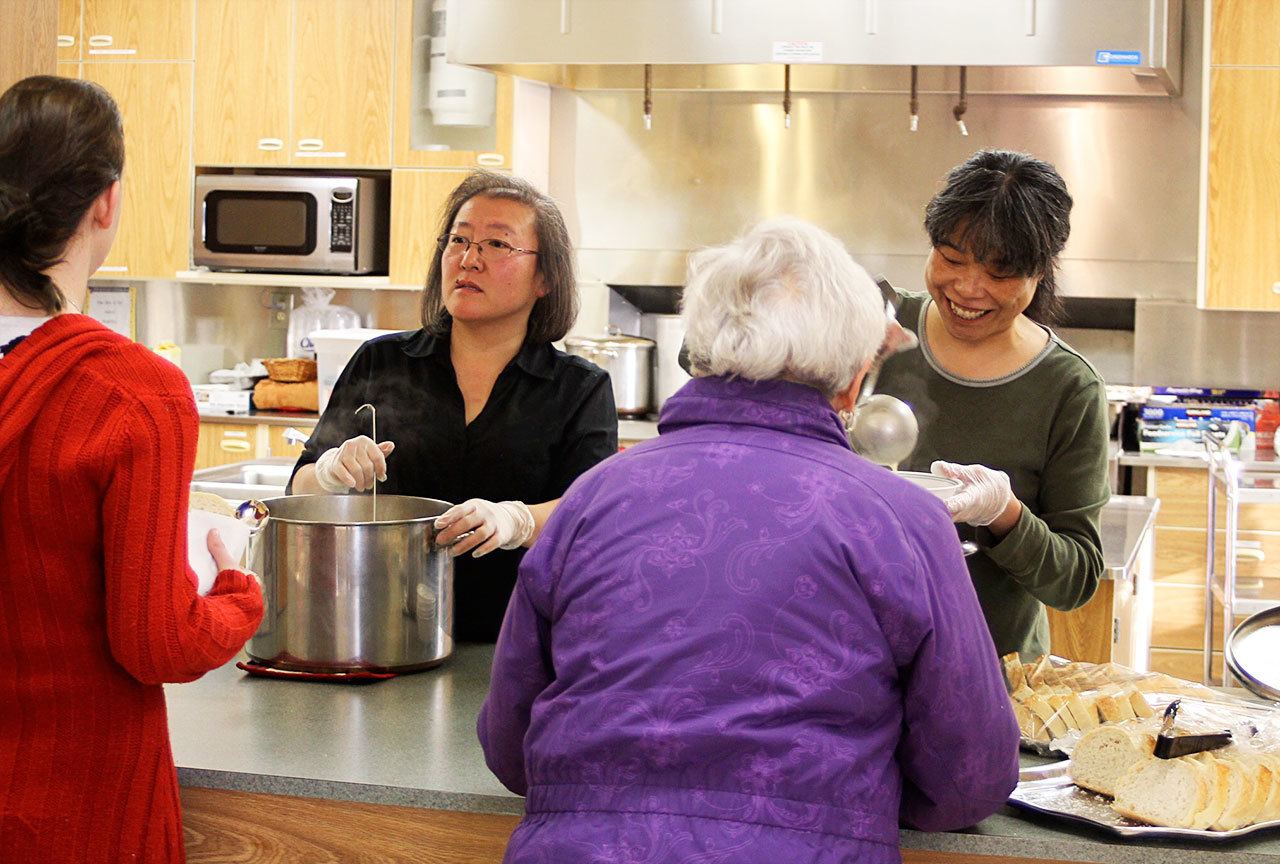Island County’s population of people living on the streets or precariously on the edge of homelessness is worse than previously estimated, new data show.
Since August, 518 individuals reported to the county that they are currently homeless, at risk for becoming homeless, living with friends or family or living in transitional housing, said Joanne Pelant, Island County Housing Resource Coordinator.
Past estimates put the total number of homeless people at 222 — most of them in the Oak Harbor area — based on the January Point in Time in Island County Count.
Pelant presented the new data Thursday at an informal “community conversation on homeless” attended by more than 150 people at Oak Harbor United Methodist Church.
IT IS the first of several public discussions planned about creating an emergency overnight year-round shelter in Oak Harbor, which does have transitional and short-term housing. Currently, the only emergency shelter on the island is at Langley’s United Methodist Church. Called a “warming center,” it opens on nights when the temperature dips below 35 degrees and is staffed by volunteers.
Oak Harbor’s center would operate nightly, open to men, women and children, who would be sleeping in separate areas and provided with a cot, bedding and access to a bathroom. Guests would agree to following strict rules banning drugs, weapons and tobacco and assist with cleaning up the facility before departing at 8 a.m.
Finding a suitable location for the shelter in Oak Harbor is the first challenge, said Faith Wilder, president of the board of the South Whidbey Homeless Coalition.
“We need a big room with a couple of bathrooms. That’s all we need,” Wilder said.
The organization is changing its name to the Whidbey Homeless Coalition as it works to add similar services to the north end of the island. The North Whidbey effort started with government departments, community groups and churches coming together and writing a basic plan for the shelter to be named Oak Harbor Haven.
WILDER EXPRESSEDhersurprise at the large turnout for the Thursday afternoon meeting.
“I’m in awe of your concern regarding the issue of our poorest neighbors,” she said. “We’ve already had 19 freezing nights at Langley’s United Methodist warming center and we expect many more.”
November’s early freeze, followed by a string of frigid December nights, is already on track to surpass the number of total freezing nights from last year — 21. Today is the first day of winter.
“With all these cold nights in a row, every night there have been more people, up to about 10 total,” Wilder said of Langley’s warming center.
About half of those people travel every day from Oak Harbor to Langley on the free Island County Transit buses, she said. But on weekends when the buses don’t run, they have “to live rough outside in Oak Harbor.”
WHIDBEY ISLAND is not immune from the national trend of rising housing costs, increased evictions, and long waiting lists for government-subsidized housing, many at the meeting noted.
Pelant explained the state now requires every county provide a one-stop service office for residents facing emergency shelter issues.
Called the Housing Support Center, based in Coupeville, families and individuals are assisted who are either at risk of becoming homeless or are already homeless. Staff connect them to housing and supportive services.
“Now anyone at risk of losing their housing can come in for help,” Pelant explained, not just those already in dire need. “This eliminates the search for services for them.”
“Since Aug. 8, our office has 238 households coming in because of a housing crisis,” she said.
Those living in North Whidbey number 166 families; while 27 live in Central Whidbey, 43 in South Whidbey and two in Camano Island.
OAK HARBOR Public Schools also tries to keep tabs on students facing homelessness. About 215 are “in transition,” the term used for those without permanent housing, said homeless liaison, Vivian Rogers-Decker.
“Many are doubled up with other members of their families due to financial hardship or they are living in hotels, RV’s or camping in a park,” she said.
Rogers-Decker is also founder of Spin Cafe in Oak Harbor that offers meals and access to public showers.
The meeting opened with Spin City staff serving up two types of soup.
While numbers give a sense of the need on Island County, they can’t predict if people will actually accept the help offered.
“I think the one big question mark is ‘who will choose to seek shelter with us?’” Wilder remarked following the 90-minute meeting. “There are people who are in their RVs, trucks and sheds and would prefer their privacy.”
And others are not particularly well socialized, she said. “Not everyone we would be willing to welcome will come.”



